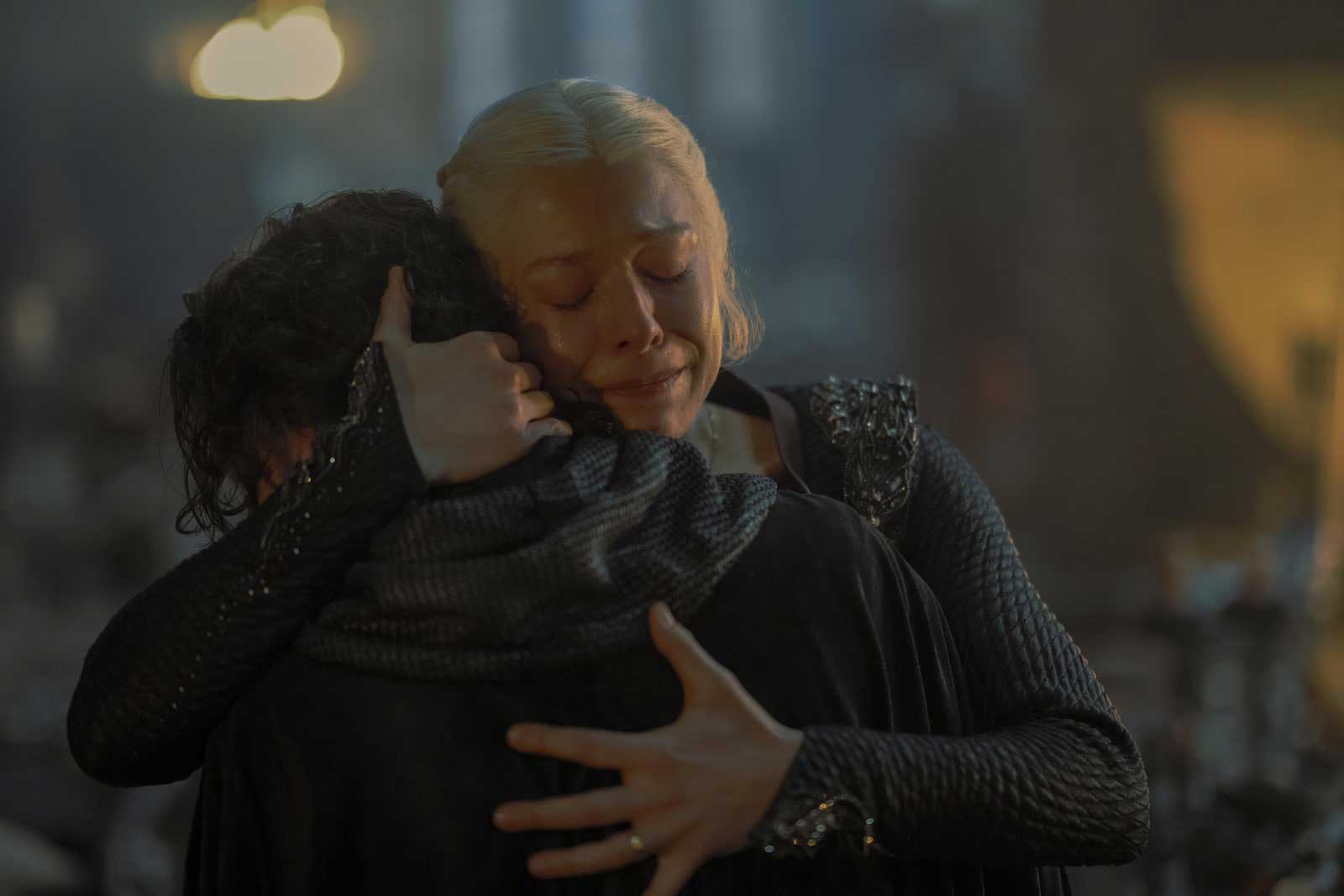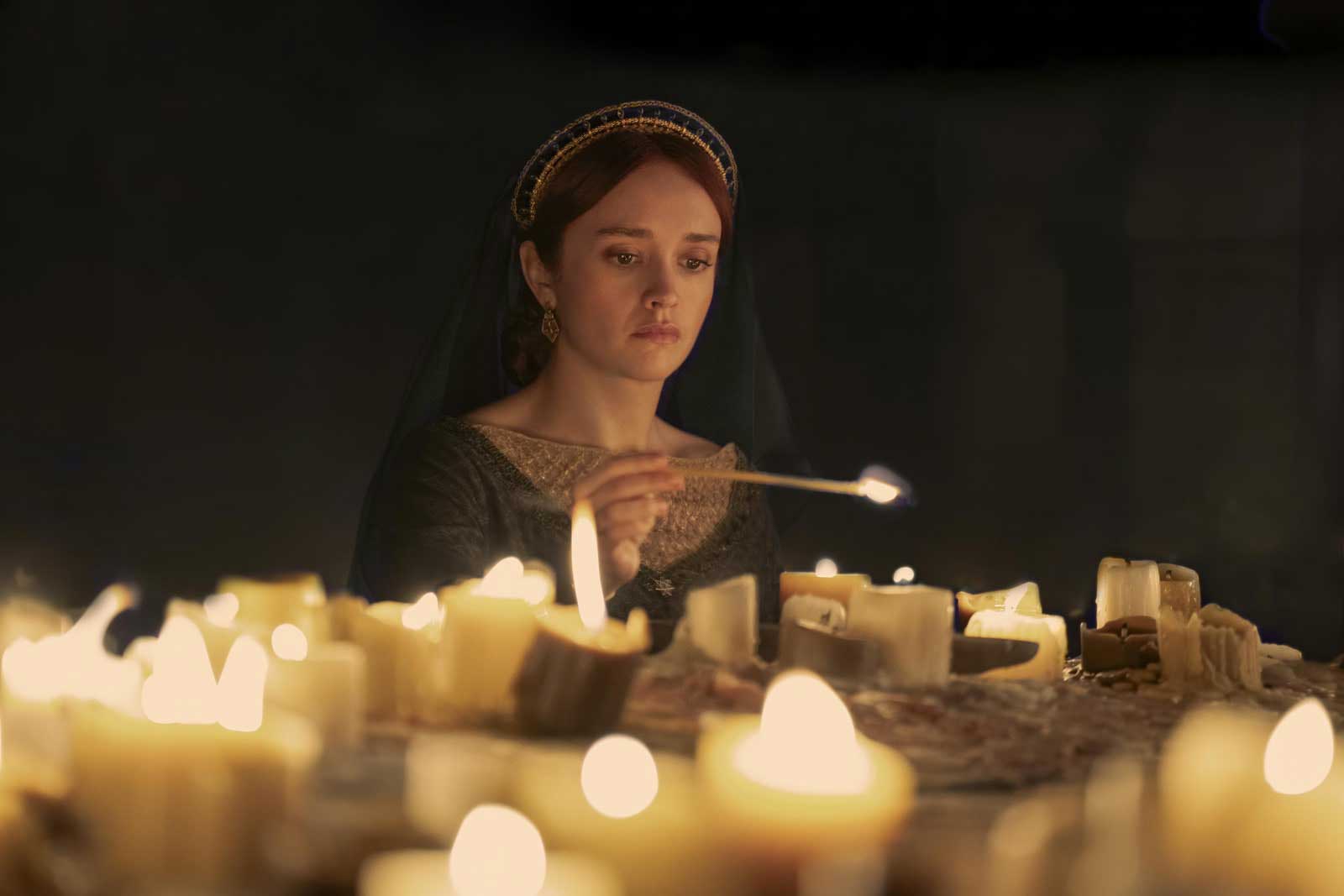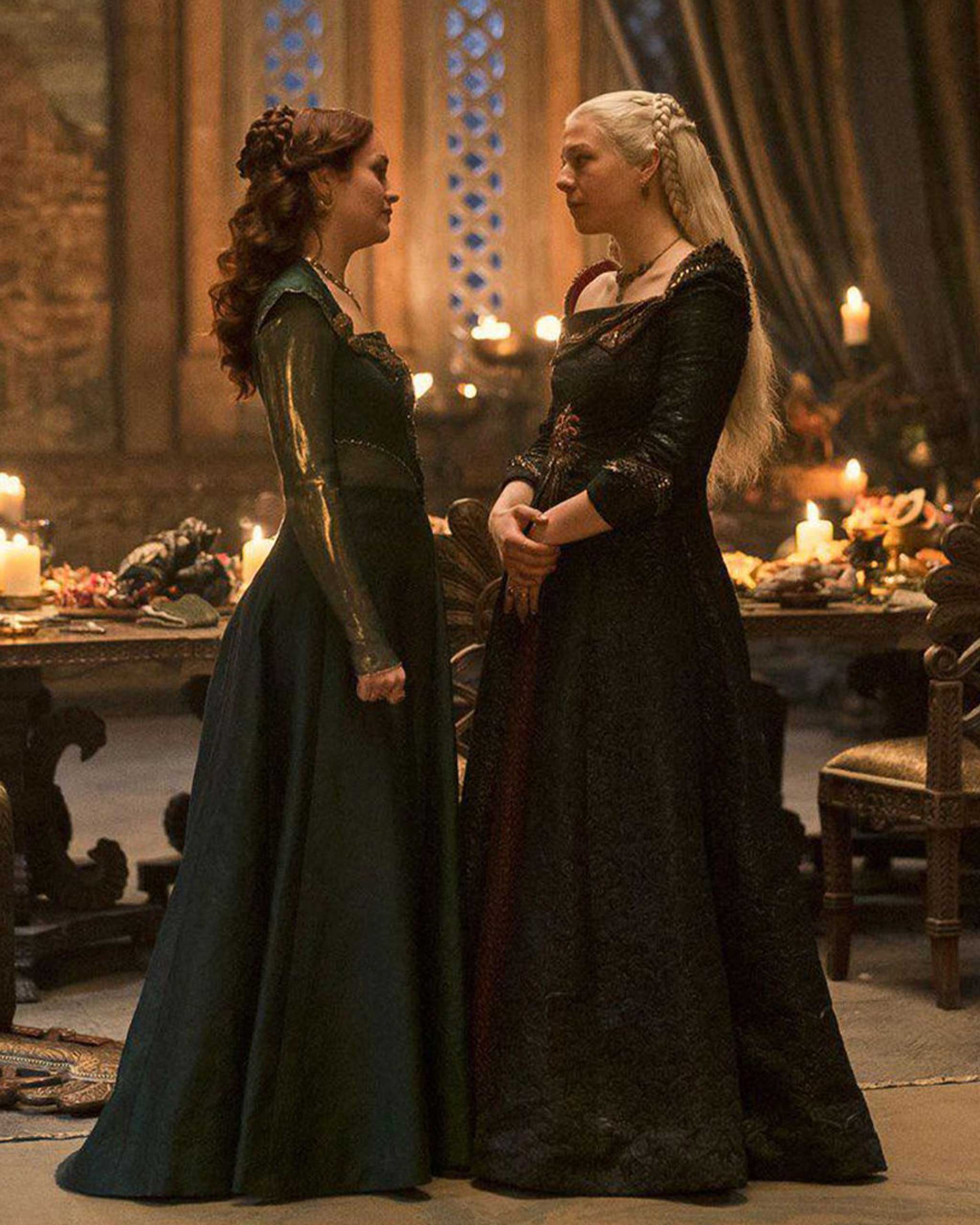Landmark Media / Alamy Stock Photo
Emma D’Arcy and Olivia Cooke have been through a lot together. The 31-year-old Gloucestershire-raised actor, whose turn as the older iteration of House of the Dragon’s fiery heir apparent Rhaenyra Targaryen earned them a Golden Globe nod, and the 30-year-old from Oldham who came to prominence simultaneously as the HBO hit’s strategic Alicent Hightower formed a close bond over the course of filming – one which became even closer after an eight-word exchange in their “get to know me” promotional video (“Negroni. Sbagliato. With prosecco in it/Oh Stunnin’!”) promptly went viral.
Countless OpEds have been penned dissecting the internet’s obsession with this moment, but key to its deliciousness was the easy, electric chemistry between the two actors. It’s apparent from the moment they first share the screen in the second half of the fantasy epic’s first season, inheriting their parts from Milly Alcock and Emily Carey, and immediately going toe to toe in their battle for power over the realm.
As the former friends’ relationship continues to sour and an all-out civil war inches closer – precipitated by the passing of Rhaenyra’s father and Alicent’s husband, King Viserys (Paddy Considine); a swift plot which sees his son Aegon (Tom Glynn-Carney) crowned over Rhaenyra, and shocks her into having a premature stillbirth; and the sudden death of Rhaenyra’s son Lucerys (Elliot Grihault) at the hands of the new king’s brother Aemond (Ewan Mitchell) – the pair are separated. But, even then, each remains at the forefront of the other’s mind, with two decades’ worth of regrets, resentment, love, betrayals and misunderstandings binding them together forever.
That indelible, indefinable connection is evident when I meet D’Arcy and Cooke on the eve of their show’s season two premiere in London. Subtly coordinated – D’Arcy in a dark double-breasted suit and Cooke in a black strapless jumpsuit – they’re prone to fits of laughter, constantly finishing each other’s sentences and clearly delighted by their reunion.
It’s a dynamic that you wish you got to see more of in Ryan Condal’s sophomore season – one which finds Rhaenyra consumed by grief and licking her wounds in Dragonstone, searching for a resolution that won’t see Westeros reduced to ash, while in King’s Landing, Alicent, having put her son on the throne, also tries to find a way to avoid more bloodshed. Meanwhile, their children, councillors and allies all seem hungry for war – and ensure there’s no turning back.
Ahead of the first episode’s release on 17 June, D’Arcy and Cooke talk to us about missing each other on set, letting loose at the pub and the clues woven into their costumes.
Season one was such a hit. Did that mean more pressure going into season two – also because you’re in the whole thing as opposed to half of it?
Emma D’Arcy: I think stamina was a big worry going in.
Olivia Cooke: And remained a worry.
ED: The great lesson was… four episodes out of 10? [Chef’s kiss] Fantastic.
OC: Stunnin’!
ED: We’d rock up, colour in our cheeks and love in our heart, shoot for a few days, go away for a couple of weeks, go back to our lives. I was on top of my laundry. It was an amazing time. But it was very different this time [laughs]. That’s galvanising in other ways, but certainly you have no choice but to have…
OC: Burnout. [Both laugh].
Well, Rhaenyra and Alicent are both dealing with a lot this season, as all these chess pieces begin to move. What were you most interested in exploring this time around?
OC: In terms of motivations and broad themes, for Alicent, it’s sort of about diminishing power. And what does she do when she doesn’t have agency or any semblance of autonomy within the castle? And who is she if she can’t shape the realm in the background? That was really interesting.
ED: And for Rhaenyra, I think grief is a major engine in the narrative this season. That was a key area of investigation for me, because grief manifests so differently in different people. I think there’s something beautiful in the way that [writers] Ryan [Condal], Sara [Hess] and the team constructed this series, in that so many of the key characters are in quite pronounced stages of grief when we meet them at the start of the first series, and not only does grief dislocate a person from their community, but it can also make people strangers to one another – like multiple grieving people can be quite profoundly changed. So, you end up with this family of strangers who are trying to navigate one another, and navigate the extreme emotional states that are happening within them, too. So, that as the image of the fallout of losing the patriarchal head of the family and the head of state is really astute and quite thrilling.

I read that Sara was also really interested in the fact that, in George R R Martin’s Fire & Blood, on which the show is based, the focus is less on Rhaenyra and Alicent in this portion of the story – she considered how women are written out of history, and wanted to write these two women back in. Was it fun to consider what they were doing in those gaps in the narrative?
OC: It’s quite a treat for them really, to do whatever they want with the characters. And also the book is, in its own way, sort of Targaryen propaganda – it’s taken from the accounts of men who want to blame it all on the women, to say that it’s their fault that there’s this huge chasm. So, trying to find the humanity within these characters and thinking about what they were actually doing and how they actually felt towards one another was really beautiful.
ED: You’re so right as well in that maybe that’s what creates such a rich relationship between the text and the screen adaptation – the idea that there is space for historical inaccuracy, and the question it raises about what doesn’t get recorded and who’s doing the recording. It’s very exciting stuff.
I also love that, despite being separated this season, there’s still this powerful, electric connection between Rhaenyra and Alicent. Did you get to talk to each other about that relationship at this stage in the story?
OC: I feel like Rhaenyra sneezes and Alicent catches a cold, you know? [Laughs] There’s this ripple effect constantly back and forth. Rhaenyra is this phantom to Alicent at this point. She gets bigger and bigger and bigger in Alicent’s mind and she’s desperate to reconnect and have some sort of face time with Rhaenyra to commune and say sorry but also try and put a plaster over this huge chasm.
ED: They’re sort of haunting one another. There’s a lot of death in the show, but these characters are also being haunted by the living, by the missing people in their lives.
How did you two deal with that separation as actors?
OC: We barely saw each other.
ED: Just in the car park, like, “How’re you doing?” [Laughs.]
OC: It is hard – the hours are so long on set, but I think, with the subject matter that we were embroiled in for all eight episodes, you have to try and keep it light and try to find the fun within the day. I’m lucky to be surrounded by incredibly funny people and so it’s a joy to come to work, even though, from action to cut, you’re trying not to cry.
ED: I… I missed ya.
OC: [Laughs] I missed you too!
ED: Like with Game of Thrones, one of the joys of a show like this, which has such an amazing, complicated constellation of characters, is seeing what happens when different people collide. I felt very lucky to get to investigate some different relationships this season, not least because it brings out different aspects of a character. Particularly with Rhaenyra, I think she has very complicated friendships with other women – they’re never straightforward, and it was interesting to think more about that and what that brings up in her.

After season one, I remember reading that you were looking for a pub near the set in Watford where you could go after filming to debrief. Did you find one? Did you find moments to decompress?
OC: We did our best. We’d meet at the pub – we’d allocate days, because we were on such different schedules. Also, we have drivers so you don’t want them to wait around while we’re at a pub in Watford and they want to get home. So, we’d either meet in town or decide, okay, this Saturday, we’re all going out. We had a mid-season cast mixer.
ED: And those things are important because you tend to be working six day weeks and 14-, 15-hour days, and it’s really lovely to put it all back into perspective a little bit and see everyone, including the people you don’t see while working. It’s great to witness people’s joy and excitement, especially people who’ve come into the show for the first time. Getting to have some evenings – that’s important.
You both have some incredible scenes. What were your favourite moments to film this season?
ED: Well, a way of dodging that question and any spoilers [laughs], would be to say that we were very lucky to have shot in north Wales for about five weeks this season. I love it there. I want to live there.
OC: You should!
ED: I think about it a lot. In fact, recently, I had a dream that there was like an underground train to north Wales. [Laughs] It was just amazing – the weather, the people, the locations. I would have happily shot the rest of the job in north Wales.
OC: And for me, I got to leave the castle and go to Spain.
ED: Which you did ask for, in fairness.
OC: If you don’t ask, you don’t get. They wrote it in and I hope it works for the plot [laughs]. I was in Spain for two weeks and that was nice.
ED: Alicent’s holiday journal.
OC: My vlog! [Mimics speaking into a phone camera] Here we are in Cáceres… That medieval town is stunning. For that to be your set every day – I felt incredibly grateful.
I’d love to ask you about your costumes, too, because I feel like there are subtle differences in them this season – especially as Rhaenyra grieves and gears up for war, and as Alicent experiences a different kind of freedom following her husband’s death.
OC: We might move away from green [laughs]. Maybe she goes to different shades of it? There’s an evolution in the way Alicent looks. We find out in episode nine of season one that one of her handmaidens has been spying on her, so that sort of devolves into her shunning her household staff and wanting to be alone more, because she’s paranoid. So, the hair is really pared back this season, as if she does it herself. I mean, I don’t do it myself – it’s too hard. The cut of her dresses too – it feels younger, in a way, like she’s shedding this role of an authority figure.
ED: Because she was aged up, in a way, by marrying Viserys. [The costume designer] Caroline [McCall] has done an extraordinary job. For Rhaenyra, there’s something quite beautiful about the way her costuming this season feels more traditional, in some ways. It’s as though it’s looking to historic shapes, almost like she’s wearing the clothes of the previous generation. In the context of having just lost her father, I find that very moving. It’s like she’s aligning herself with him, but also it’s a sort of coupling with the past. She spends a lot of time looking at the history of her family this season, as though she’s looking for a clue to her own future. She’s aligned with the old Targaryen gods. There’s almost a desire for small “c” conservatism in this conjuring of the dead.
And she’s discovering what kind of leader she is. I was really struck by the scenes where both of your characters are undermined at council tables by the men around them. While these two women are urging caution, everyone else seems ready for war.
OC: Yeah, it was being surrounded by these men who are so eager to have their names in the annals of history, regardless of the cost to the kingdom. It’s actually really hard on the day shooting those scenes where you feel so undermined and you’re being spoken over and you feel like… I also feel meek and bound and small. You feel this rush of emotion despite yourself, trying in vain to speak to this group of very hormonal, jacked up men.
ED: And for Rhaenyra this season, not only is her leadership, battle strategy and political campaign being judged harshly from without, it’s also being ripped to shreds by her supposed allies and councilmen. I agree with you that those scenes are hard to shoot – I find them so tiring. The text is great and, often, we are not given the words to meet that criticism in the way that one would like to. So, you are literally de-voiced in a room of men. And it’s interesting, right? Those male characters are comfortable with power in a way that certainly Rhaenyra and also possibly Alicent are not. There’s a rub in terms of being a character who has to actively put on the cloak of power and try to wear it and try to wield it in some way. Those men wear it without noticing.
I wanted to end by asking you about Bluets, Emma, which you’re currently performing on stage at The Royal Court. What’s that been like? And Olivia, have you been to see it yet?
ED: It’s been great. It’s a very technical show – we were basically in tech for five, six weeks. But, it’s been lovely. We’ve been open for about a month now. [Bluets’s director] Katie Mitchell, who is a big hero of mine, came back to see the show recently and it feels like… you know when leather wears in nicely? It feels nicely worn in. It’s a really extraordinary collision of artists, so I could never have said no to it. Plus, it’s my favourite colour.
OC: And I haven’t seen it yet, but I need to go soon!
House of the Dragon series two launches on Sky and Now on 17 June.
This article was originally published on British Vogue.
- Feuding Designers, ’70s Socialites And Impeccably Dressed Grifters: 8 Stylish Period Dramas To Look Out For In 2024
- Exclusive: XO, Kitty’s Anna Cathcart On Exploring The Show’s New Feelings
- The White Lotus Season 2 Villa Is Available To Book For A Stay On Airbnb
- Of Course, the Best Cannes Outfits Aren’t Actually on the Red Carpet
